Unit 10 If you go to the party, you'll have a great time!复习课件(共37张PPT)
文档属性
| 名称 | Unit 10 If you go to the party, you'll have a great time!复习课件(共37张PPT) |

|
|
| 格式 | pptx | ||
| 文件大小 | 18.8MB | ||
| 资源类型 | 教案 | ||
| 版本资源 | 人教新目标(Go for it)版 | ||
| 科目 | 英语 | ||
| 更新时间 | 2021-11-27 00:00:00 | ||
图片预览


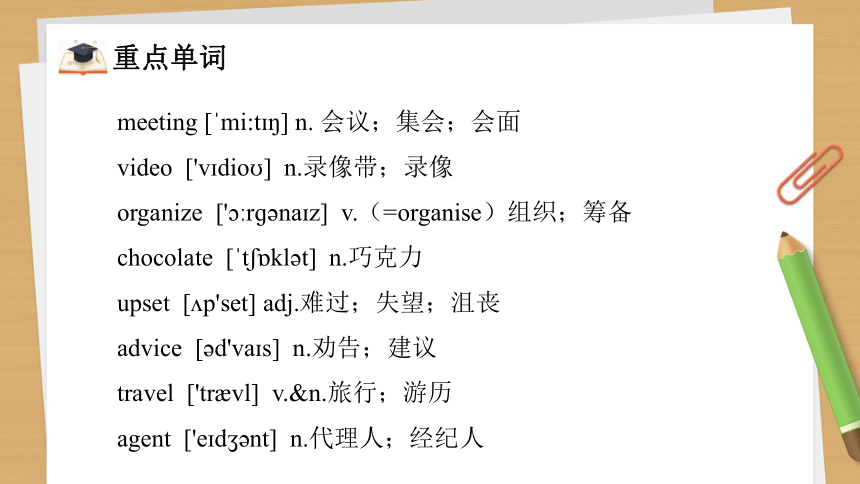
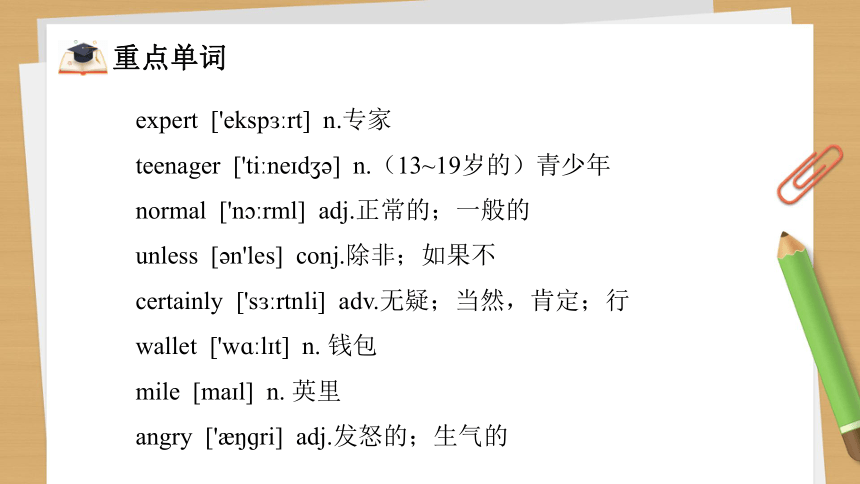
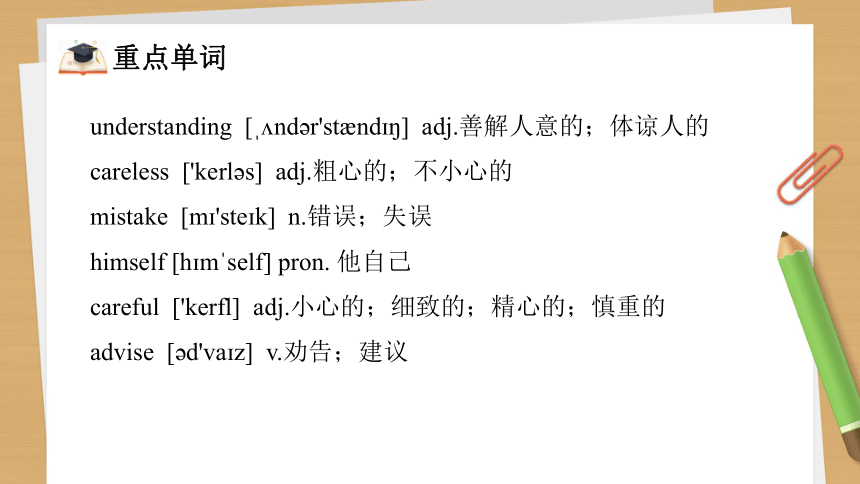
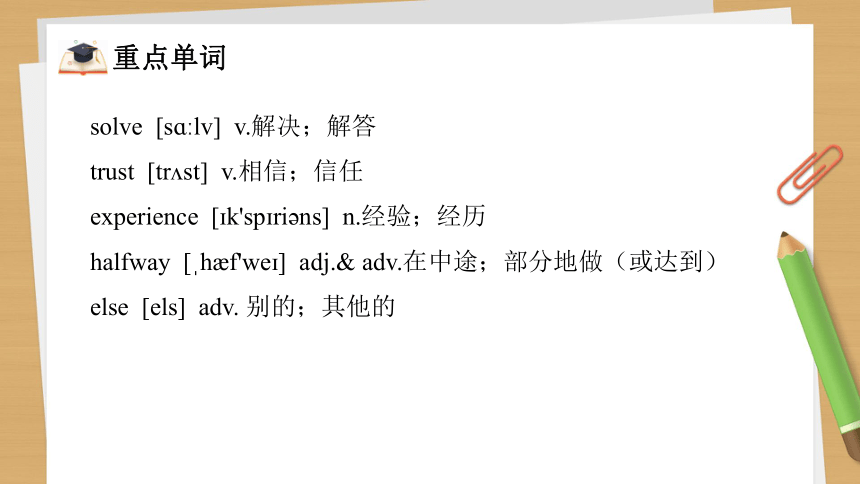
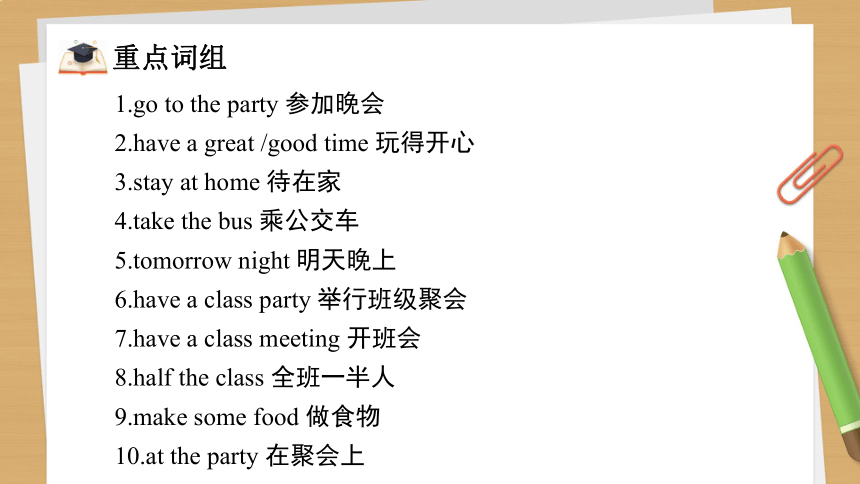
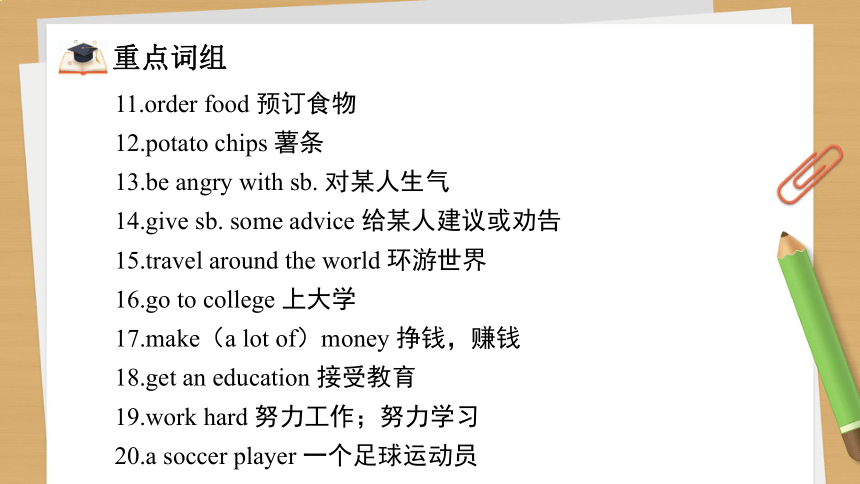
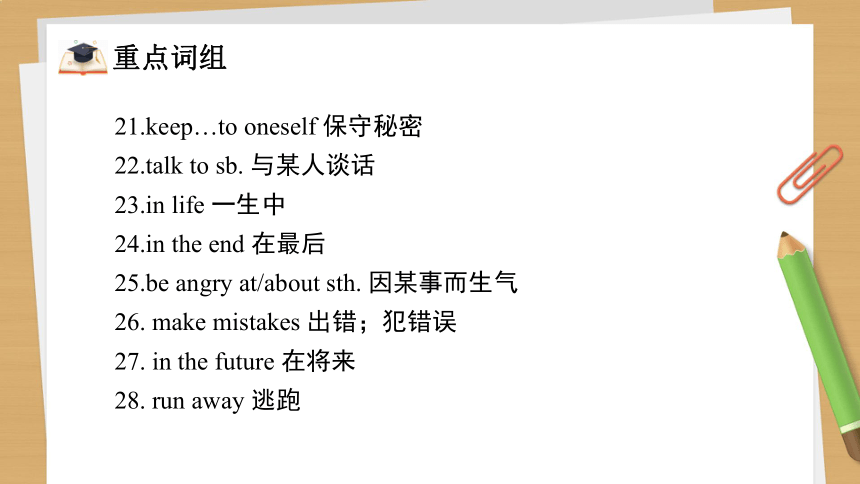
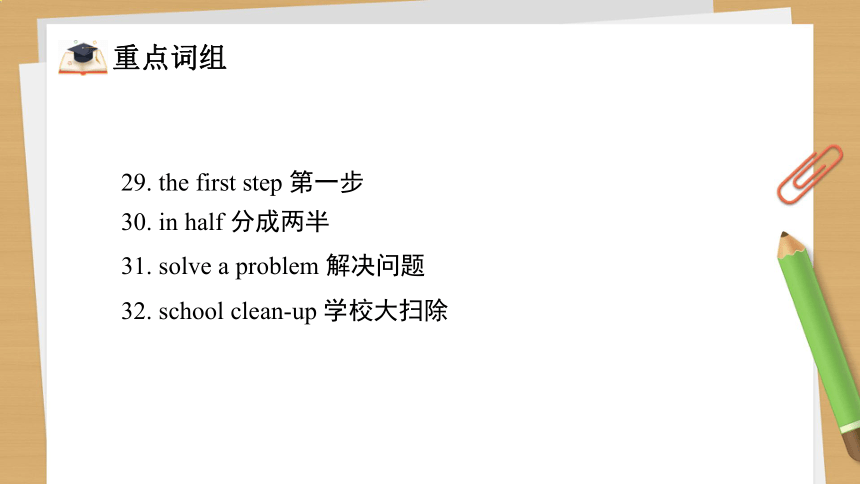
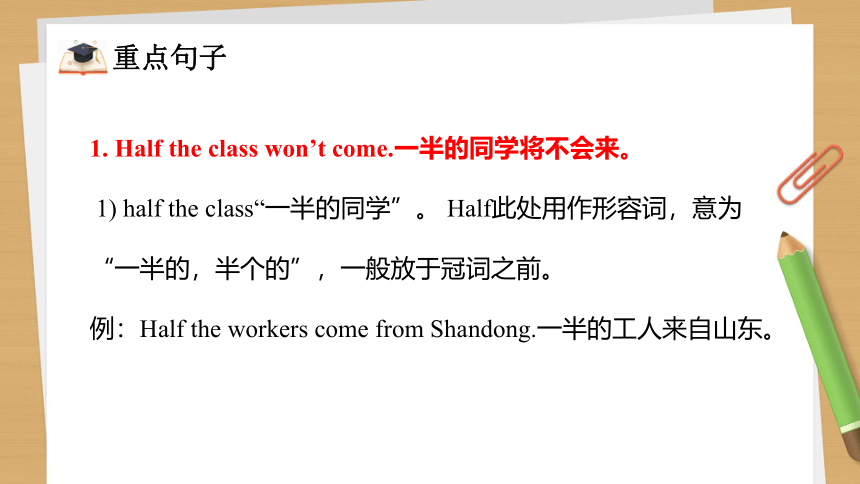
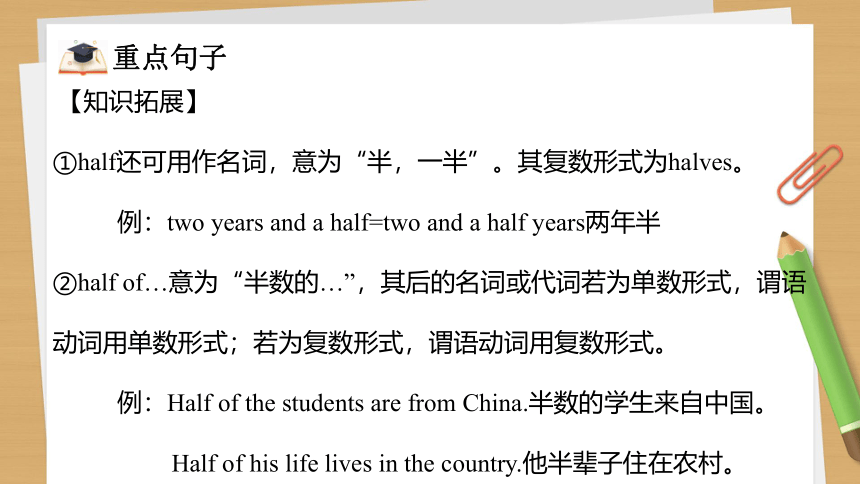
文档简介
(共37张PPT)
《必考点·必提分》
Unit 10
人教新目标英语八年级上册
目录
重点单词
重点词组
重点语法
重点句子
重点单词
meeting [ mi:t ] n. 会议;集会;会面
video ['v dio ] n.录像带;录像
organize [' rɡ na z] v.(=organise)组织;筹备
chocolate [ t kl t] n.巧克力
upset [ p'set] adj.难过;失望;沮丧
advice [ d'va s] n.劝告;建议
travel ['tr vl] v.&n.旅行;游历
agent ['e d nt] n.代理人;经纪人
重点单词
expert ['eksp rt] n.专家
teenager ['ti ne d ] n.(13~19岁的)青少年
normal ['n rml] adj.正常的;一般的
unless [ n'les] conj.除非;如果不
certainly ['s rtnli] adv.无疑;当然,肯定;行
wallet ['wɑ l t] n. 钱包
mile [ma l] n. 英里
angry [' ɡri] adj.发怒的;生气的
重点单词
understanding [ nd r'st nd ] adj.善解人意的;体谅人的
careless ['kerl s] adj.粗心的;不小心的
mistake [m 'ste k] n.错误;失误
himself [h m self] pron. 他自己
careful ['kerfl] adj.小心的;细致的;精心的;慎重的
advise [ d'va z] v.劝告;建议
重点单词
solve [sɑ lv] v.解决;解答
trust [tr st] v.相信;信任
experience [ k'sp ri ns] n.经验;经历
halfway [ h f'we ] adj.& adv.在中途;部分地做(或达到)
else [els] adv. 别的;其他的
重点词组
1.go to the party 参加晚会
2.have a great /good time 玩得开心
3.stay at home 待在家
4.take the bus 乘公交车
5.tomorrow night 明天晚上
6.have a class party 举行班级聚会
7.have a class meeting 开班会
8.half the class 全班一半人
9.make some food 做食物
10.at the party 在聚会上
重点词组
11.order food 预订食物
12.potato chips 薯条
13.be angry with sb. 对某人生气
14.give sb. some advice 给某人建议或劝告
15.travel around the world 环游世界
16.go to college 上大学
17.make(a lot of)money 挣钱,赚钱
18.get an education 接受教育
19.work hard 努力工作;努力学习
20.a soccer player 一个足球运动员
重点词组
21.keep…to oneself 保守秘密
22.talk to sb. 与某人谈话
23.in life 一生中
24.in the end 在最后
25.be angry at/about sth. 因某事而生气
26. make mistakes 出错;犯错误
27. in the future 在将来
28. run away 逃跑
重点词组
29. the first step 第一步
30. in half 分成两半
31. solve a problem 解决问题
32. school clean-up 学校大扫除
重点句子
1. Half the class won’t come.一半的同学将不会来。
1) half the class“一半的同学”。 Half此处用作形容词,意为“一半的,半个的”,一般放于冠词之前。
例:Half the workers come from Shandong.一半的工人来自山东。
重点句子
【知识拓展】
①half还可用作名词,意为“半,一半”。其复数形式为halves。
例:two years and a half=two and a half years两年半
②half of…意为“半数的…”,其后的名词或代词若为单数形式,谓语动词用单数形式;若为复数形式,谓语动词用复数形式。
例:Half of the students are from China.半数的学生来自中国。
Half of his life lives in the country.他半辈子住在农村。
重点句子
2)class此处是集合名词,意为“全班同学”,表示成员。作主语时,谓语动词用复数形式。
例:Half the class come from the village.一半的学生来自这个村庄。
重点句子
2.let’s order food from a restaurant.让我们从饭店订餐吧。
order及物动词,意为“订购,订货;点菜;命令”。此处:
1)order sth from+地点 : 从某地订购某物
例:I order some clothes from that shop.我从那家商店订购了些衣服。
2)order意为“命令;嘱咐”时:order sb to do sth命令某人做某事
例:Order him to act at once!命令他立即行动!
重点句子
3)order作不可数名词,意为“秩序,顺序”。
例:Put the sentences in right order.按正确的顺序排列句子
4)order可构成in order to或in order that…结构,意为“为了…”
例:He gets up early in order to catch the early bus.
=He gets up early in order that he can catch the early bus.
他早起是为了赶上早班公共汽车。
重点句子
3.If we ask people to bring food,they’ll just bring potato chips and chocolate because they’ll be too lazy to cook.如果我们让人们带食物来,他们只会带炸薯条和巧克力,因为他们懒得去做饭。
1)ask sb to do sth“要求某人做某事”,其否定形式为ask sb not to do sth“要求某人不要做某事”。
例:He asked us to read every day.我们的老师要求我们每天阅读。
重点句子
2)too…to…“太…而不能…”,表示否定意义。 too后跟形容词或副词,to后跟动词原形。
例:The box is too heavy to carry.这个箱子太重以至于搬不动。
重点句子
【知识拓展】too…to…常见考点:
1)若句子的主语与动词不定式的逻辑主语不一致,通常用too…for sb to…结构,意为“对某人来说太…而不能…”。
例:The question is too difficult for me to answer.这个问题对我来书太难了,我回答不出来。
重点句子
2)若句子主语是物,动词不定式不能用it作宾语。
例:这个箱子太重,我们搬不动。
(正确)The box is too heavy for us to carry.
(错误)The box is too heavy for us to carry it.
3)too…to…结构可与“not…enough to do sth不够…而不能…”及“so…that… 如此…以至于”结构进行同义句转换。
例:He is too young to go to school.他太小了而不能去上学。
=He is not old enough to go to school.
=He is so young that he can’t go to school.
重点句子
4.If I take a taxi, it will be too expensive.如果乘出租车去,将会太昂贵。
take a taxi乘出租车
例:I sometimes take a taxi to school.我有时乘出租车去学校。
重点句子
【知识拓展】
1)英语中交通方式的表达方式:
①take+a/the+交通工具 这是一个动词短语,在句中用作谓语。
例:I often take a bus to school.我经常乘公共汽车去上学。
②by+交通工具 这是一个介词短语,在句中用作状语。注意:by后跟交通工具的单数形式,且交通工具前不能有任何修饰词。例:I go to school by bus.我乘公共汽车去上学。
③用某些动词短语表示,如walk to…(步行去…);drive to…(开车去…);fly to…(乘飞机去…,飞往…)。
重点句子
2)对交通方式提问用疑问词how。
例:-How do you go to school 你怎样去上学?
-By bus./On foot.乘公共汽车。/步行。
重点句子
5.Can you give me some advice please 能请你给我一些建议吗?
advice不可数名词,意为“劝告,建议”。 表示数量时要借助于piece或some, much等词。
例:a piece of advice一条建议
two pieces of advice两条建议
give sb some advice给某人提一些建议
get advice from从…获取建议
重点句子
6.If people have problems,they should talk to other people.如果人们有问题,他们应该与他人交谈。
talk to sb意为“与某人交谈”
例:I like talking to my mother.我喜欢与我妈妈谈话。
【知识拓展】 talk with/to sb与某人交谈
talk about谈论
talk over商量,讨论
重点句子
7.Unless we talk to someone, we’ll certainly feel worse.如果我们不与人聊聊,肯定会感觉更糟。
unless“除非…,如果不…,除了…”,引导条件状语从句。
例:I won’t go to the party unless I hear from her.
我不去参加聚会,除非我收到她的来信。
重点句子
【知识拓展】
unless可与if引导的否定条件状语从句进行同义句转换。
例:You’ll be late unless you hurry up.
=You’ll be late if you don’t hurry up.
如果你不快点儿,你将会迟到。
重点句子
8.What else can you get advice from 你还能从其他谁那儿得到建议?
else副词,意为“其他,别的”,常位于疑问代词或不定代词之后。
例:What else can you see in the picture
在图片中你还能看到其他什么?
重点句子
【知识拓展】else与other的区别
else 修饰疑问代词、疑问副词或不定代词,置于这些词之后。 Is anyone else going to the party
还有其他人去参加聚会吗?
other 修饰名词,且位于名词之前 What other things can you see in the room 你在房间里还能看见别的什么东西?
1.Jim ran fast ________ get to school on time.
A.in order that B.in order to
C.so as not to D.in order
2.My little son _____ go to sleep ______ I tell him a story every night.
A.doesn't; if B.won't; if
C.doesn't; unless D.won't; unless
练一练
3.It will be harmful to your hearing ________ you always listen to music by earphone (耳机).
A.if B.so C.and D.but
4.I spent ______ searching the ancient village in the mountain area of Guizhou.
A.two day and a half B.two days and a half
C.two and a half day D.two and half a day
练一练
重点语法
1.时态运用:当主句是以下三种情况时,从句要用一般现在时。
1)主句是一般将来时(主将从现)
2)主句是含情态动词may/might/can/must/should等的句子。(主情从现)
If引导的条件状语从句
重点语法
3)主句是祈使句。(主祈从现)
例:If he comes, he will bring his violin.如果他来,他就会带来他的小提琴。
If you want to lose weight, you must eat less bread.如果你想减肥,你必须少吃面包。
If you are not strong enough, please don’t take part in this activity.
如果你不是很健壮,请不要参加这个活动。
重点语法
2.句型转换:
1)借助“祈使句+and/or+句子(一般将来时结构)”这一句型来转换。其中,在句意上and表示顺承;or表示转折,意为“否则”。
例:If you work hard, you’ll pass the exam easily.努力学习,你将很容易通过考试。
=Work hard, and you’ll pass the exam easily.
=Work hard, or you won’t pass the exam easily.
重点语法
2)借助without或with来转换条件状语从句。
例:If there is no water, fish will die.
=Fish will die without water.如果没有水,鱼将会死。
If you help me, I’ll finish the work soon.
=With your help, I’ll finish the work soon.如果你帮助我,我将很快完成工作。
1.You will be able to get good marks________.
A.while you are doing your homework by yourself
B.if you do some revision every day
C.before you being to study hard
D.until you follow your teachers’ advice
练一练
2.I don't know ________ he will come tomorrow. ________ he comes, I'll tell you.
A.if; Whether B.whether; Whether
C.if; That D.if; If
练一练
谢谢观看
《必考点·必提分》
Unit 10
人教新目标英语八年级上册
目录
重点单词
重点词组
重点语法
重点句子
重点单词
meeting [ mi:t ] n. 会议;集会;会面
video ['v dio ] n.录像带;录像
organize [' rɡ na z] v.(=organise)组织;筹备
chocolate [ t kl t] n.巧克力
upset [ p'set] adj.难过;失望;沮丧
advice [ d'va s] n.劝告;建议
travel ['tr vl] v.&n.旅行;游历
agent ['e d nt] n.代理人;经纪人
重点单词
expert ['eksp rt] n.专家
teenager ['ti ne d ] n.(13~19岁的)青少年
normal ['n rml] adj.正常的;一般的
unless [ n'les] conj.除非;如果不
certainly ['s rtnli] adv.无疑;当然,肯定;行
wallet ['wɑ l t] n. 钱包
mile [ma l] n. 英里
angry [' ɡri] adj.发怒的;生气的
重点单词
understanding [ nd r'st nd ] adj.善解人意的;体谅人的
careless ['kerl s] adj.粗心的;不小心的
mistake [m 'ste k] n.错误;失误
himself [h m self] pron. 他自己
careful ['kerfl] adj.小心的;细致的;精心的;慎重的
advise [ d'va z] v.劝告;建议
重点单词
solve [sɑ lv] v.解决;解答
trust [tr st] v.相信;信任
experience [ k'sp ri ns] n.经验;经历
halfway [ h f'we ] adj.& adv.在中途;部分地做(或达到)
else [els] adv. 别的;其他的
重点词组
1.go to the party 参加晚会
2.have a great /good time 玩得开心
3.stay at home 待在家
4.take the bus 乘公交车
5.tomorrow night 明天晚上
6.have a class party 举行班级聚会
7.have a class meeting 开班会
8.half the class 全班一半人
9.make some food 做食物
10.at the party 在聚会上
重点词组
11.order food 预订食物
12.potato chips 薯条
13.be angry with sb. 对某人生气
14.give sb. some advice 给某人建议或劝告
15.travel around the world 环游世界
16.go to college 上大学
17.make(a lot of)money 挣钱,赚钱
18.get an education 接受教育
19.work hard 努力工作;努力学习
20.a soccer player 一个足球运动员
重点词组
21.keep…to oneself 保守秘密
22.talk to sb. 与某人谈话
23.in life 一生中
24.in the end 在最后
25.be angry at/about sth. 因某事而生气
26. make mistakes 出错;犯错误
27. in the future 在将来
28. run away 逃跑
重点词组
29. the first step 第一步
30. in half 分成两半
31. solve a problem 解决问题
32. school clean-up 学校大扫除
重点句子
1. Half the class won’t come.一半的同学将不会来。
1) half the class“一半的同学”。 Half此处用作形容词,意为“一半的,半个的”,一般放于冠词之前。
例:Half the workers come from Shandong.一半的工人来自山东。
重点句子
【知识拓展】
①half还可用作名词,意为“半,一半”。其复数形式为halves。
例:two years and a half=two and a half years两年半
②half of…意为“半数的…”,其后的名词或代词若为单数形式,谓语动词用单数形式;若为复数形式,谓语动词用复数形式。
例:Half of the students are from China.半数的学生来自中国。
Half of his life lives in the country.他半辈子住在农村。
重点句子
2)class此处是集合名词,意为“全班同学”,表示成员。作主语时,谓语动词用复数形式。
例:Half the class come from the village.一半的学生来自这个村庄。
重点句子
2.let’s order food from a restaurant.让我们从饭店订餐吧。
order及物动词,意为“订购,订货;点菜;命令”。此处:
1)order sth from+地点 : 从某地订购某物
例:I order some clothes from that shop.我从那家商店订购了些衣服。
2)order意为“命令;嘱咐”时:order sb to do sth命令某人做某事
例:Order him to act at once!命令他立即行动!
重点句子
3)order作不可数名词,意为“秩序,顺序”。
例:Put the sentences in right order.按正确的顺序排列句子
4)order可构成in order to或in order that…结构,意为“为了…”
例:He gets up early in order to catch the early bus.
=He gets up early in order that he can catch the early bus.
他早起是为了赶上早班公共汽车。
重点句子
3.If we ask people to bring food,they’ll just bring potato chips and chocolate because they’ll be too lazy to cook.如果我们让人们带食物来,他们只会带炸薯条和巧克力,因为他们懒得去做饭。
1)ask sb to do sth“要求某人做某事”,其否定形式为ask sb not to do sth“要求某人不要做某事”。
例:He asked us to read every day.我们的老师要求我们每天阅读。
重点句子
2)too…to…“太…而不能…”,表示否定意义。 too后跟形容词或副词,to后跟动词原形。
例:The box is too heavy to carry.这个箱子太重以至于搬不动。
重点句子
【知识拓展】too…to…常见考点:
1)若句子的主语与动词不定式的逻辑主语不一致,通常用too…for sb to…结构,意为“对某人来说太…而不能…”。
例:The question is too difficult for me to answer.这个问题对我来书太难了,我回答不出来。
重点句子
2)若句子主语是物,动词不定式不能用it作宾语。
例:这个箱子太重,我们搬不动。
(正确)The box is too heavy for us to carry.
(错误)The box is too heavy for us to carry it.
3)too…to…结构可与“not…enough to do sth不够…而不能…”及“so…that… 如此…以至于”结构进行同义句转换。
例:He is too young to go to school.他太小了而不能去上学。
=He is not old enough to go to school.
=He is so young that he can’t go to school.
重点句子
4.If I take a taxi, it will be too expensive.如果乘出租车去,将会太昂贵。
take a taxi乘出租车
例:I sometimes take a taxi to school.我有时乘出租车去学校。
重点句子
【知识拓展】
1)英语中交通方式的表达方式:
①take+a/the+交通工具 这是一个动词短语,在句中用作谓语。
例:I often take a bus to school.我经常乘公共汽车去上学。
②by+交通工具 这是一个介词短语,在句中用作状语。注意:by后跟交通工具的单数形式,且交通工具前不能有任何修饰词。例:I go to school by bus.我乘公共汽车去上学。
③用某些动词短语表示,如walk to…(步行去…);drive to…(开车去…);fly to…(乘飞机去…,飞往…)。
重点句子
2)对交通方式提问用疑问词how。
例:-How do you go to school 你怎样去上学?
-By bus./On foot.乘公共汽车。/步行。
重点句子
5.Can you give me some advice please 能请你给我一些建议吗?
advice不可数名词,意为“劝告,建议”。 表示数量时要借助于piece或some, much等词。
例:a piece of advice一条建议
two pieces of advice两条建议
give sb some advice给某人提一些建议
get advice from从…获取建议
重点句子
6.If people have problems,they should talk to other people.如果人们有问题,他们应该与他人交谈。
talk to sb意为“与某人交谈”
例:I like talking to my mother.我喜欢与我妈妈谈话。
【知识拓展】 talk with/to sb与某人交谈
talk about谈论
talk over商量,讨论
重点句子
7.Unless we talk to someone, we’ll certainly feel worse.如果我们不与人聊聊,肯定会感觉更糟。
unless“除非…,如果不…,除了…”,引导条件状语从句。
例:I won’t go to the party unless I hear from her.
我不去参加聚会,除非我收到她的来信。
重点句子
【知识拓展】
unless可与if引导的否定条件状语从句进行同义句转换。
例:You’ll be late unless you hurry up.
=You’ll be late if you don’t hurry up.
如果你不快点儿,你将会迟到。
重点句子
8.What else can you get advice from 你还能从其他谁那儿得到建议?
else副词,意为“其他,别的”,常位于疑问代词或不定代词之后。
例:What else can you see in the picture
在图片中你还能看到其他什么?
重点句子
【知识拓展】else与other的区别
else 修饰疑问代词、疑问副词或不定代词,置于这些词之后。 Is anyone else going to the party
还有其他人去参加聚会吗?
other 修饰名词,且位于名词之前 What other things can you see in the room 你在房间里还能看见别的什么东西?
1.Jim ran fast ________ get to school on time.
A.in order that B.in order to
C.so as not to D.in order
2.My little son _____ go to sleep ______ I tell him a story every night.
A.doesn't; if B.won't; if
C.doesn't; unless D.won't; unless
练一练
3.It will be harmful to your hearing ________ you always listen to music by earphone (耳机).
A.if B.so C.and D.but
4.I spent ______ searching the ancient village in the mountain area of Guizhou.
A.two day and a half B.two days and a half
C.two and a half day D.two and half a day
练一练
重点语法
1.时态运用:当主句是以下三种情况时,从句要用一般现在时。
1)主句是一般将来时(主将从现)
2)主句是含情态动词may/might/can/must/should等的句子。(主情从现)
If引导的条件状语从句
重点语法
3)主句是祈使句。(主祈从现)
例:If he comes, he will bring his violin.如果他来,他就会带来他的小提琴。
If you want to lose weight, you must eat less bread.如果你想减肥,你必须少吃面包。
If you are not strong enough, please don’t take part in this activity.
如果你不是很健壮,请不要参加这个活动。
重点语法
2.句型转换:
1)借助“祈使句+and/or+句子(一般将来时结构)”这一句型来转换。其中,在句意上and表示顺承;or表示转折,意为“否则”。
例:If you work hard, you’ll pass the exam easily.努力学习,你将很容易通过考试。
=Work hard, and you’ll pass the exam easily.
=Work hard, or you won’t pass the exam easily.
重点语法
2)借助without或with来转换条件状语从句。
例:If there is no water, fish will die.
=Fish will die without water.如果没有水,鱼将会死。
If you help me, I’ll finish the work soon.
=With your help, I’ll finish the work soon.如果你帮助我,我将很快完成工作。
1.You will be able to get good marks________.
A.while you are doing your homework by yourself
B.if you do some revision every day
C.before you being to study hard
D.until you follow your teachers’ advice
练一练
2.I don't know ________ he will come tomorrow. ________ he comes, I'll tell you.
A.if; Whether B.whether; Whether
C.if; That D.if; If
练一练
谢谢观看
同课章节目录
- Unit 1 Where did you go on vacation?
- Section A
- Section B
- Unit 2 How often do you exercise?
- Section A
- Section B
- Unit 3 I'm more outgoing than my sister.
- Section A
- Section B
- Unit 4 What's the best movie theater?
- Section A
- Section B
- Unit 5 Do you want to watch a game show?
- Section A
- Section B
- Unit 6 I'm going to study computer science.
- Section A
- Section B
- Unit 7 Will people have robots?
- Section A
- Section B
- Unit 8 How do you make a banana milk shake?
- Section A
- Section B
- Unit 9 Can you come to my party?
- Section A
- Section B
- Unit 10 If you go to the party, you'll have a grea
- Section A
- Section B
